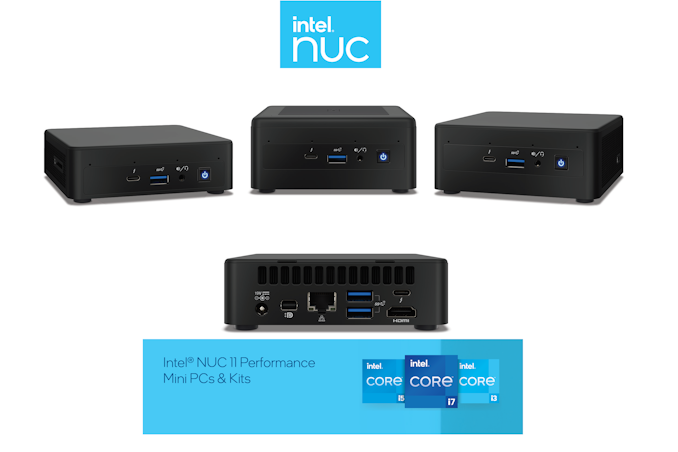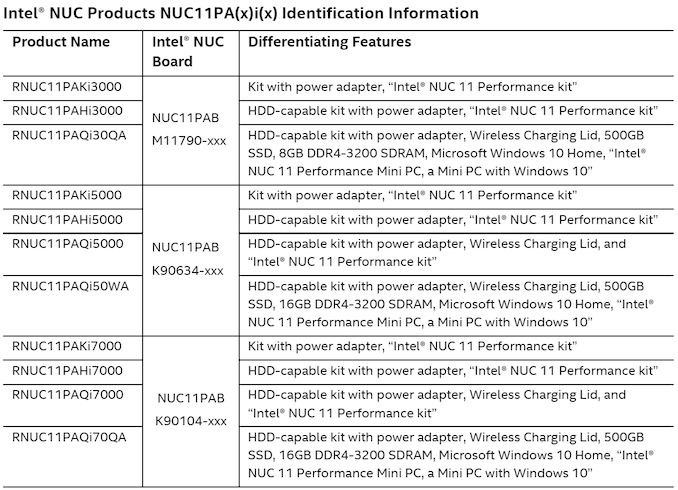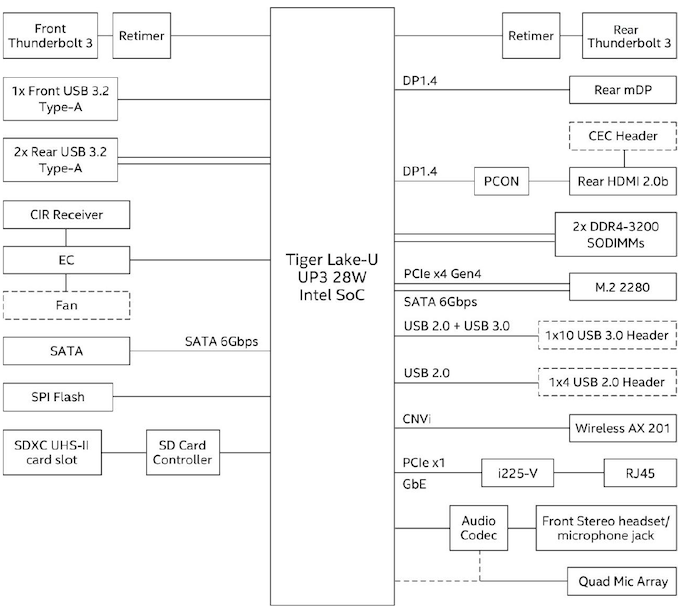
Original Link: https://www.anandtech.com/show/16430/intel-unveils-nuc11-performance-panther-canyon-nucs
Intel Unveils Panther Canyon NUC11 Family: Tiger Lake Comes to NUCs
by Ganesh T S on January 18, 2021 8:00 AM EST- Posted in
- Systems
- Intel
- Trade Shows
- NUC
- Tiger Lake
- CES 2021
- NUC11

As part of its CES 2021 announcements, Intel officially unveiled a number of NUCs based on their Tiger Lake SoCs. Intel's initial NUCs were all based on 100mm x 100mm (4in x 4in) boards, kickstarting the UCFF craze that contributed to revitalizing the PC market. Over the last few years, we have seen Intel expand the NUC to encompass multiple other form-factors, while keeping compactness in mind:
- Performance: The original 4x4 UCFF units
- Pro: 4x4 UCFF units with expansion support and vPro capabilities
- Compute Elements: Add-in Card form factor with carrier boards for system design
- Extreme: Compute Elements using a 45W TDP processor with a base board hosting up to three PCIe expansion slots (inclusive of a M.2 22110 NVMe slot) and a 5L chassis enabling compact gaming and workstation PCs
- Rugged: NUCs designed for operation in industrial and factory-floor type environments, sporting processors based on the Atom microarchitecture
- Essential: 4x4 NUCs sporting processors based on the Atom microarchitecture
- Laptop Kit: Reference design / whitebook models for OEMs to bring notebooks to market faster
- Enthusiast: Compact PCs with a 5.5in. x 8in. motherboard sporting a discrete GPU (either soldered or in-package)
The Panther Canyon NUCs are the Tiger Lake-based "Performance-class" units, with eleven different SKUs based on three different boards.
All the models operate the Tiger Lake processors (Core i7-1165G7, Core i5-1135G7, or the Core i3-1115G4) with a TDP of 28W. The K and H kits are the usual ones we have seen in previous generations - the latter has support for the installation of a 2.5" drive. Panther Canyon also has a Q SKU that adds a wireless charging lid (up to 15W) on top of the H chassis. The specifications are summarized in the table below.
| Intel Panther Canyon NUC (Tiger Lake-U) Lineup | ||||
| Model | NUC11PA{K/H/Q}i3 | NUC11PA{K/H/Q}i5 | NUC11PA{K/H/Q}i7 | |
| CPU | Intel Core i3-1115G4 2C/4T 1.7 - 4.1 GHz (3.0 GHz) 12 - 28 W (28W) |
Intel Core i5-1135G7 4C/8T 0.9 - 4.2 GHz (2.4 GHz) 12 - 28 W (28W) |
Intel Core i7-1165G7 4C/8T 1.2 - 4.7 GHz (2.8 GHz) 12 - 28 W (28W) |
|
| GPU | Intel® UHD Graphics for 11th Gen Intel® Processors (48EU) @ 1.25 GHz | Intel® Iris® Xe Graphics (80EU) @ 1.3 GHz | Intel® Iris® Xe Graphics (96EU) @ 1.3 GHz | |
| DRAM | Two DDR4 SO-DIMM slots Up to 64 GB of DDR4-3200 in dual-channel mode |
|||
| Motherboard | 4.13" x 4.16" UCFF | |||
| Storage | SSD | 1x M.2-2280 (PCIe 4.0 x4 (CPU-direct) or SATA III) | ||
| DFF | 1 × SATA III Port (for 2.5" drive) | |||
| Card Slots | Full-sized SDXC UHS-II | |||
| Wireless | Intel Wi-Fi 6 AX201 2x2 802.11ax Wi-Fi + Bluetooth 5.1 module |
|||
| Ethernet | 1 × 2.5 GbE port (Intel I225-V) | |||
| USB | Front | 1 × USB 3.2 Gen 2 Type-A 1 x Thunderbolt 3 Type-C |
||
| Rear | 2 × USB 3.2 Gen 2 Type-A 1 × Thunderbolt 3 |
|||
| Display Outputs | 1 × HDMI 2.0b 1 x mini-DP 1.4a 2 × DisplayPort 1.4 (using Thunderbolt 3 Type-C ports) |
|||
| Audio | 1 × 3.5mm audio jack (Realtek) | |||
| PSU | External (90W) | External (120W) | ||
| Dimensions | Length: 117 mm Width: 112 mm Height: 38mm (K), 51mm (H), 56mm (Q) |
|||
| MSRP | ? | ? | ? | |
Intel's technical product specifications provide additional details on the I/Os. We see the front and rear Thunderbolt ports (curiously, marketed as Thunderbolt 3 instead of Thunderbolt 4) are enabled directly from the TGL-U processor. Two display outputs (DP 1.4a) are also routed through these Thunderbolt ports within the processor itself.
Interestingly, a protocol converter is still needed on the board to convert the DP 1.4a display output to HDMI 2.0b. There is a PCIe 4.0 x4 lanes set for attaching a NVMe SSD. The high-speed I/O lanes are multiplexed with a SATA port allowing the installation of a M.2 SATA SSD in the same slot. The LAN port is enabled by the i225-V 2.5 Gbps controller, while the SDXC card slot on the side requires an additional SDXC bridge chip. The Wi-Fi 6 capabilities are enabled by the soldered Intel AX201 CNVi card.
Panther Canyon looks to be a solid upgrade over the Frost Canyon NUC despite the loss of a couple of cores (the Frost Canyon NUC was a hexa-core affair), thanks to the improved CPU microarchitecture and a host of system-level upgrades. On the latter front, we have an additional Thunderbolt port, a 2.5 Gbps LAN port (compared to the regular Gigabit port in the Frost Canyon NUC), ability to install a PCIe 4.0 NVMe SSD, and the ability to drive up to four 4Kp60 displays. Additionally, we also have some of the Panther Canyon SKUs sporting a 15W wireless charging lid.
Various reseller listings have come up for the Panther Canyon NUCs in Europe. However, Intel has not provided a concrete launch date or pricing details for any of the SKUs yet.
Source: Intel









